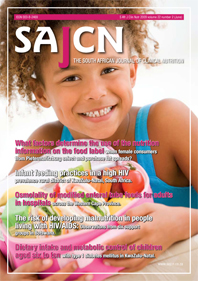Dietary intake and metabolic control of children with Type 1 Diabetes Mellitus aged 6-10 years in KwaZulu-Natal
Keywords:
Type 1 Diabetes Mellitus, children
Abstract
Objectives: To assess the dietary intake and metabolic control of children with Type 1 diabetes. Design: A cross-sectional observational study was carried out. Subjects: A total of 30 subjects aged 6-10 years were included in the study. Setting: The study was conducted at the Paediatric Diabetic Clinics at Grey’s Hospital, Pietermaritzburg and Inkosi Albert Luthuli Central Hospital (IALCH), Durban in KwaZulu-Natal. Outcome measures: Dietary intake was assessed using a 3-day dietary record as well as a 24-hour recall of the third day of the dietary record. Metabolic control was assessed using glycosylated haemoglobin (HbA1c). Results: The mean percentage contribution of macronutrients to total energy as determined by the 3 day dietary records and the 24 hour recalls were as follows: carbohydrate (52% and 49%); sucrose (2% and 2%); protein (16% and 17%); fat (32% and 34%) respectively. The intakes were similar to the recommendations by the International Society for Pediatric and Adolescent Diabetes (ISPAD) Consensus Guidelines (2002). Micronutrient intake was generally adequate but calcium and vitamin D intakes were found to be low. The mean glycosylated haemoglobin (HbA1c) for the sample was 9.7%. There was a significant positive correlation between age of the participant and mean HbA1c (r=0.473; p=0.008) and a significant negative correlation between the education level of the caregiver and the mean HbA1c (r=-0.578; p=0.005). Conclusion: The macronutrient intake in this sample was found to be similar to the ISPAD Consensus Guidelines (2002) while calcium and vitamin D intakes were low. Overall the sample had poor metabolic control.
Published
2009-05-31
How to Cite
Pillay, K., Maunder, E., & Naidoo, K. (2009). Dietary intake and metabolic control of children with Type 1 Diabetes Mellitus aged 6-10 years in KwaZulu-Natal. South African Journal of Clinical Nutrition, 22(2), 95. Retrieved from http://sajcn.redbricklibrary.com/index.php/SAJCN/article/view/289
Issue
Section
Original Research
Material submitted for publication in the South African Journal of Clinical Nutrition (SAJCN) is accepted provided it has not been published elsewhere. Copyright forms will be sent with acknowledgement of receipt and the SAJCN reserves copyright of the material published.
The SAJCN does not hold itself responsible for statements made by the authors.


